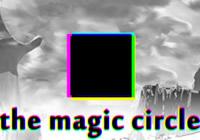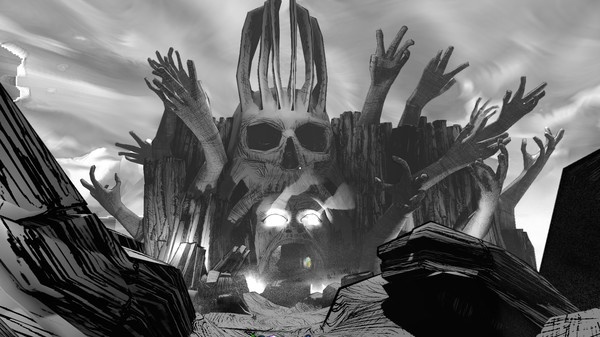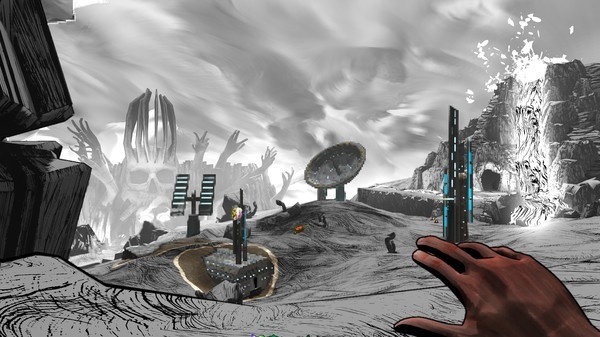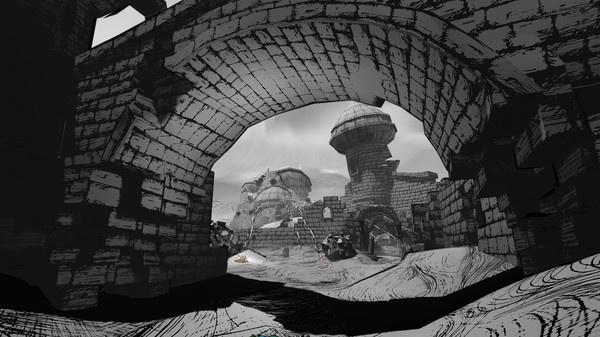The Magic Circle (PC) Review
By Jordan Hurst  23.01.2016
23.01.2016

In any ranking of the most important game developers, Looking Glass Studios needs to be at or near the top. In addition to blessing the world with the System Shock and Thief series, the company's final years at the end of the millennium saw its talent and philosophies disseminated into at least three successor companies. With a mix of old and new blood, these companies went on to produce Deus Ex, BioShock, and Dishonored - a repertoire known professionally as a big freaking deal. Now, a trio of second-generation Looking Glass emigrants have released The Magic Circle, a game - fittingly enough - about legacy, among several other things.
Champions of games as art tend to love interactive metafiction, so they are likely to find a new darling with The Magic Circle. The plot takes place inside the eponymous videogame, the successor to a fictional text adventure that was so successful and well-regarded that it propelled its creator into cult celebrity on par with a Romero-Newell-Kojima hybrid…and gave him a massive god complex in the process. His rampant perfectionism (and the conflicting ideologies of the other designer "gods") has resigned the project to development hell - and literal hell, from the perspective of a defunct AI protagonist trapped in the stalled programme. This AI enlists the player to piece together something functional from the wreckage, in the hopes that he will be able to live his life as part of a released product.
The themes in this ridiculous exercise in self-awareness are numerous, but because they are all related to game development (a concept that any prospective users undoubtedly have at least a cursory understanding of), they all resonate. In addition to being a playable treatise on the conflict between auteur and committee design, it's also an irreverent satire of gaming at large. The story progresses at the expense of half a dozen of the industry's favourite potentially shady business tools, including pre-ordering, 'Early Access,' and episodic titles, as well as the E3 hype machine. Meanwhile, the three main "gods" are all barely exaggerated caricatures of infamous fan types: those that aren't satisfied unless they can show off their skill, those who consider "fun" to be beneath their genius minds, and those crazy devoted ones who just take their hobby way too seriously.

The way the story progresses is also insanely ambitious. About an hour in, the player discovers the game's previous version and begins pulling in elements from it to fill in the gaps in the current iteration. With the overall goal (reach and hijack a god avatar) established not long after, it's reasonable to assume that this aesthetic juxtaposition is exclusively how the tale will play out. The story is not over when this goal is reached, however, as two additional sequences form its jaw-dropping finale instead. The specifics of these won't be spoiled here, but suffice it to say, The Magic Circle is a narrative tour de force. While some plot points test suspension of disbelief, the satirical (in other words, deliberately exaggerated to make a point) nature of the work mostly excuses them.
For those wondering what kind of gameplay mechanics could be used to deliver all this, the answer is: unorthodox ones. The primary abilities are restoring deleted content and editing the world's inhabitants - specifically any creature's allegiances, passive abilities, and methods of locomotion and attack can be altered, as long as the target is within range. To balance the overwhelming power this would normally give to those in control, object properties are collectible and come in limited quantities. A random animal can't just be given fire breath, since that trait has to be stolen from an existing animal first. The result can best be described as a sandbox puzzler, where obstacles are overcome by pitting them against specialised hybrids whose pieces were found and assembled all over the map.
The implementation of these powers is, admittedly, rather messy. The interface is made needlessly complicated by a refusal to leave the first-person perspective even in the editing menu, and the inability to affect a group of entities en masse is a glaring omission. With one or two exceptions, small followings are always more practical than armies, so this might be forgiven…except there is never any discouragement for the mass accumulation of minions, despite how instinctive a play style it actually is. Additionally, while the ability to summon edited objects from anywhere is greatly appreciated, the map quickly becomes so overloaded with useless junk that immediately stripping the components off every encounter becomes more convenient than summoning specific ones when needed.

Nevertheless, as with its Looking Glass-related spiritual predecessors, The Magic Circle's freeform nature is what makes its gameplay so enticing. The "puzzles" are totally organic challenges with no definitive solution, and the available creature properties are imaginative enough to fuel a decent amount of experimentation. Furthermore, since finding the pieces of each puzzle is as important as putting them together, there's a significant exploration component to the experience, and the game world is unusual and intricate enough to support anyone's curiosity. It's clear that the developer understands its audience; for instance, ascending a barely climbable boulder reveals a note from an in-universe designer basically saying, "We should redesign this boulder. The playtesters keep trying to climb it."
This openness is not without its flaws, however. The other secrets aren't quite as clever as the boulder one, and the omission of a run button from such a large world seems like an obvious mistake. It also takes a little while for the collectible traits to gain any depth, likely because there's so much narrative that needs to be established first. Fortunately, finding and altering creatures' abilities aren't the only tricks this has up its sleeve. Occasionally, there will be a need to solve problems by deleting the main avatar (read: dying) and navigating the ghost world of deleted content that results. On to of this, the two additional sequences that close the tale drastically change the mechanics while still remaining rooted in the core editing feature, such that the segments still clearly belong in the existing game.

That said, they are still indicative of The Magic Circle's frequently impractical ambition. The new features introduced in these final areas could have supported an entire product on their own, but instead they are only used for a combined hour of play time, teasing the audience with an overwhelming set of possibilities that never come to fruition. The main section doesn't evade this fault, either. The editing feature is akin to a more concentrated Scribblenauts, which sounds fantastic, but it's fallen too far to the other end of the focus spectrum. As interesting as some of the available creature alterations can be, this system has enormous potential that simply cannot be explored with only a few hours of open-world puzzle-solving.
The ambition is evident even in the aesthetics, with three complete art styles at play: the monochrome cel-shaded sketches comprising the world's current form, its previous appearance as a low-res System Shock imitation, and a coloured and textured version of the former, representing anything player-related. The sketch form is certainly striking, but it and its coloured edition are noticeably unpolished. This could be justified with the context - they are part of an unfinished game in-universe, after all. Whether that excuse is adequate is highly subjective, however. Similarly, while the heavily aliased sci-fi elements can't really be considered attractive, they are eerily accurate as mid-'90s period imagery. As for audio, the consistently spectacular voice acting makes the story scenes and collectible audio logs a joy to observe, although the regular sound effects are rather bland and repetitive.

Cubed3 Rating
Very Good - Bronze Award

The wonderful irony of The Magic Circle is that despite the extreme cynicism that informed its creation, it's actually representative of many of the positive aspects of modern gaming. Its biting humour and brilliant premise place it as part of a vanguard of indie titles keeping videogames more alive and engaging than ever, beneath the AAA mire. It's a very human product and, as such, makes some very human mistakes (most notably dreaming up amazing gameplay systems that vastly outstrip its own scope), but that's an acceptable price to pay for a work of genuine creative vision.
Comments
Comments are currently disabled

 Sign In
Sign In Game Details
Game Details
 Out now
Out now  Out now
Out now  None
None  Out now
Out now  Subscribe to this topic
Subscribe to this topic Features
Features





 Top
Top

